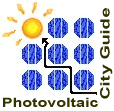

PV City Guide
AIMS - The PV City Guide aims to provide local and regional authorities as well as related professionals (urban designers and developers, project developers and builders) with the necessary information and instruments to define, evaluate, plan and implement PV projects in an urban environment. The project builds on existing work (Thermie, Altener, IEA SHCP and PVPS) and has developed a series of national guides on the use and promotion of photovoltaic solar systems in urban areas in Europe. The guides are aimed at people who are involved in the development or urban areas and energy generation for urban areas, including: public sector planners, local energy agencies, utilities, architects, engineers, cost advisors, financiers and developers.The guides cover 4 major
areas:
OBJECTIVES - The objective of this project was to develop and disseminate a series of National PV City Guides. The guides are designed for practical use by the target groups to form an accepted approach towards the realisation of future projects. The guides have been developed throughout the project and tested in ongoing BIPV projects and will achieve these objectives in terms of community social objectives by careful attention to local involvement and replicability. This is demonstrated by the stated interest in the project of the cities and/or regional authorities of Bristol, Woking, Barcelona, Basel, Florence, Brussels and Zurich as well as several entities in Sweden and also the involvement of the Energie-Citės network in international promotion of the project.
The PV City Guide focuses on the approach from the urban design and buildings perspective and thus represents the 'user' or the 'demand side' requirements. Therefore, the guides have been developed with a strong focus on integration of photovoltaics in buildings in the urban context. In each participating country, a number of local or regional public authorities as well as other important actors in urban development have been contacted who have expressed an interest in serving as information and feedback sources for the project. The critical factors are assessed in a comparative manner for all countries involved in order to achieve a European project dimension.
This site brought to you by Energy for Sustainable Development (ESD) Limited